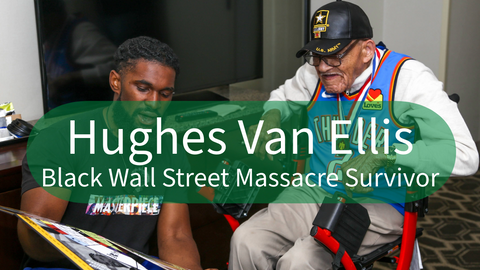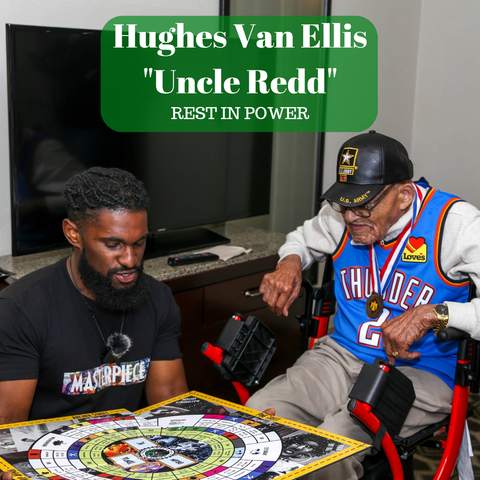Hughes Van Ellis "Uncle Redd" Black Wall Street Massacre Survivor Dies at 102
Hughes Van Ellis also known as "Uncle Redd", one of three known remaining survivors of the 1921 Black Wall Street Massacre became an Ancestor on Monday in Denver, Colorado. He was 102. Our team had the honor of meeting Mr. Ellis and his big sister Mother Fletcher when we traveled to Tulsa's Black Wall Street in 2021. We are thankful for the once in a lifetime moment.

Mr. Ellis was born in Holdenville,OK on Jan. 11, 1921. He wasn't yet 5 months old at the time of the Black Wall Street Massacre, after which his parents fled Tulsa with their six children, leaving their home , and personal items behind.
“Because of the massacre, my family was driven out of our home,” Mr. Ellis told members of a House Judiciary subcommittee in May 2021. “We were left with nothing. We were made refugees in our own country.”
"He was drafted and served in an all-Black combat unit in World War II," Ms. Watson said. He and his wife, Mable V. Ellis, were married in 1942, eventually settling in Oklahoma City.
"Mr. Ellis worked as a sharecropper and as a mechanic at what is now Tinker Air Force Base," Ms. Watson said. He also worked as a janitor, a gardener and a gas station attendant, his daughter said. He and his wife had seven children and settled in Denver. Ms. Ellis died in 2011.
With his death, only Lessie Benningfield Randle, 108, and Mr. Ellis’s big sister Viola Ford Fletcher, 109, remain as the last known survivors of the Massacre. The mob killed hundreds of Black Tulsans and burned much of Greenwood's neighborhood to the ground in one of the worst Massacres in Modern U.S. history.
If you don't know Greenwood also known as Tulsa's Black Wall Street was one of the most economically successful Black Communities in History. With over 100 Black Owned businesses this community started building in 1906 when OW Gurley purchased 40 acres of barren land and started the first business in the Greenwood District. To learn more about the businesses of Tulsa's Black Wall Street we encourage you to visit Tulsa or get Black Wall Street the Board Game.

On May 31, 1921, a Black man, Dick Rowland, was accused of sexually assaulting a White woman in an elevator. After he was arrested, a group of armed Black veterans, fearful he'd be lynched, gathered outside the county courthouse to insure his safety.
Hundreds of white Tulsans called on the sheriff to turn Mr. Rowland over and, according to a 2001 report by the Oklahoma Commission to Study the Tulsa Race Riot of 1921, a Black man’s gun went off when a white man tried to snatch it from his hands.
White men were deputized and spread out through the Greenwood District, shooting Black Men on sight and setting fire to businesses in Greenwood. According to records 300 Black people were killed, 1,200 homes were destroyed, and countless generational wealth was lost.
This is the trauma that Hughes Van Ellis and his big sister were able to survive. Despite the known history and evidence found the survivors of the Black Wall Street Massacre have never received any payment for the property lost or pain experience.

In 2020,Mr. Ellis, Ms. Fletcher and Ms. Randle joined descendants of other victims of the Black Wall Street Massacre in filing an action seeking restitutions for the losses they endured. Seven defendants were named in the action, including the megacity of Tulsa, the Tulsa County Sheriff’s Office, the Oklahoma National Guard and the megacity’s Chamber of Commerce.
The History of Tulsa's Black Wall Street must be taught. Play Black Wall Street is proud to continue our partnership with the survivors of the Black Wall Street Massacre through our "Make America Remember" shirts, which shares profits with the survivors even past their lifetime. Do what you can today to remember the legacy of Tulsa's Black Wall Street and spread the message.
We Will Rebuild.